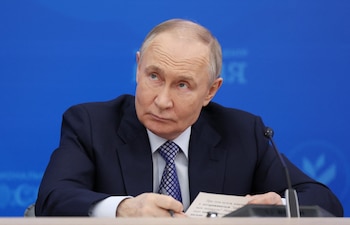
Group of Seven (G7) finance ministers on Friday discussed new sanctions and trade measures, including tariffs, against countries they see as"enabling" Russia's war in Ukraine, Canada's finance ministry said.
The meeting, chaired by Canadian official Francois-Philippe Champagne, focused on discussing strategies to increase economic pressure on Moscow and force it to end the conflict. The official statement noted that the ministers evaluated “a wide range of possible economic measures to increase pressure on Russia, including new sanctions and trade measures, such as tariffs, on those enabling Russia’s war effort.”
During the call, U.S. Treasury Secretary Scott Bessent called on his colleagues to join Washington in imposing tariffs on countries that buy Russian oil. He and U.S. Trade Representative Jamieson Greer stated that “only a unified effort to root out the revenue that funds Putin’s war machine can bring the economic pressure to bear to end this senseless killing.”
Both officials highlighted commitments to increase sanctions pressure and explore the use of frozen Russian sovereign assets for Ukraine's defense.

Earlier, a U.S. Treasury spokesman called on G7 allies and the European Union to impose “significant tariffs” on products from China and India to stop their purchases of Russian oil.
Days earlier, President Donald Trump announced an additional 25% tariff on Indian goods, bringing the total tariffs to 50%, aimed at curbing the purchase of discounted Russian crude. However, no additional tariffs were imposed on China, amid a trade truce between Washington and Beijing.
Bessent is scheduled to travel to Madrid for talks with Chinese Vice Premier He Lifeng on trade, TikTok’s U.S. operations and anti-money laundering measures. Trump also expressed frustration with Putin’s failure to stop the war, saying, “We’re going to have to take very, very strong measures,” without announcing any additional sanctions at the time.
On another front, the G7 Rapid Response Mechanism countries issued a statement denouncing the Iranian regime's transnational political persecution and"other malign activities," including assassination attempts, kidnappings, and harassment of political opponents abroad, as well as operations to extract information from journalists and attacks on Jewish communities. The group assured that it will continue to defend its sovereignty and the safety of its citizens in the face of these actions.
The statement was signed by G7 members (Canada, France, Germany, Italy, Japan, the United Kingdom, the United States, and the European Union) and by associated states such as Australia, the Netherlands, New Zealand, and Sweden, reaffirming their intention to counter foreign interference and protect their communities from the overreach of foreign governments.

